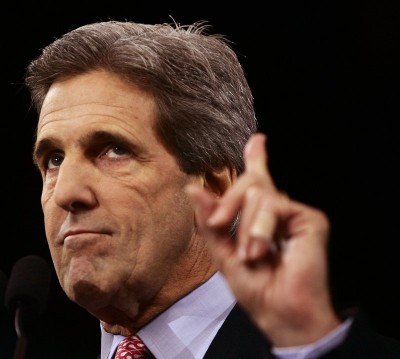By Frank Gaffney, Jr. – Center for Security Policy
Members of the United States Senate are surely tempted to give their insufferably arrogant colleague from Massachusetts a pass in confirmation hearings for his nomination to become the next Secretary of State. Quite apart from the tradition of senatorial courtesy practiced in the exclusive club once known as “the world’s greatest deliberative body,” most of them must be anxious to see John Kerry leave it.
There are, however, compelling reasons to resist this temptation and ensure that Sen. Kerry is subjected to rigorous scrutiny with respect to his past conduct, his judgment and his policy predilections.
Conventional wisdom holds that he is certain to be confirmed. Whether that proves to be the case or not, Senators have a duty to serve as the Framers had in mind– as a means of ensuring quality control with respect to cabinet-level and other senior presidential appointments and with respect to the treaties that a secretary of state in particular is wont to promote.
A number of topics cry out for such scrutiny. Herewith a few of the more important:
For starters, there is the question of John Kerry’s integrity. His conduct during and immediately his service in the Vietnam War– much of it compellingly documented by his former comrades-in-arms in the Swift Boat community– suggests a serious deficit in this personal quality. Senators could usefully revisit Mr. Kerry’s damning indictments of the U.S. military’s conduct of the war, including his depiction of its alleged “war crimes,” his fraudulent Winter Soldier testimony and his treating with the North Vietnamese enemy in the midst of hostilities.
Mr. Obama also observed that Sen. Kerry will not require “a lot of on the job training” because of his extensive dealings with foreign leaders, including in his role as chairman of the Senate Foreign Relations Committee. Among those with whom he has consorted are Syrian despotBasher Assad and Nicaragua’s Sandinista revolutionaries during their conflict with the United States in the 1980s. As the Wall Street Journal’s Mary Anastasia O’Grady put it last week: “Mr. Kerry’s record of promoting American values abroad is dismal. It isn’t that he opposes U.S. intervention – far from it. The trouble is that he has a habit of intervening on behalf of bad guys.”
As Jim Kouri of the Law Enforcement Examiner pointed out recently, Senator Kerry has also been suspected by the FBI of problematic dealings with the Communist Chinese. Kouri cites revelations by Judicial Watch in 2004 based on government records obtained through a Freedom of Information Act request. The investigative organization’s president, Tom Fitton, said: “These disturbing FBI documents raise further questions about Sen. Kerry’s involvement in what looks like a quid pro quo (cash for meetings) with the Communist Chinese.”
Senators will want to examine closely John Kerry’s promotion of the United Nations and various treaties that would increase its stature, influence and/or power at the expense of U.S. sovereignty. Cases in point are his support for the Disabilities Convention recently rejected by the Senate, the Comprehensive Test Ban Treaty rejected by it in 1999 and the Law of the Sea Treaty that Senators may reject this year.
Because the Senate has actually been performing its constitutional quality control function with respect to such defective accords, there is growing concern that the Obama administration may pursue its goal of denuclearizing the United States through unilateral action. As John Bolton and John Yoo observed in the Wall Street Journal, a Secretary Kerry would likely support the findings of
a State Department advisory group headed by former Defense Secretary William Perry suggest[ing] that Mr. Obama ignore Congress. Its November report urges that America and Russia reciprocally reduce nuclear weapons without any international agreement: ‘Unilateral and coordinated reductions can be quicker and less politically costly… relative to treaties with adversarial negotiations and difficult ratification processes.'”
Senators should seize this chance to make clear their strong objection to such a strategically reckless and constitutionally unacceptable disarmament strategy.
Speaking of the Constitution, the Kerry nomination would be a good time for a debate about the Obama administration’s practice of dispensing with its requirements. A December 30th op.ed. by a law school professor at Georgetown published in the New York Times under the controversial title “Let’s Give Up on the Constitution” seems to track with the practice of the former law school professor at Chicago who is now president of the United States.
Of particular concern is a priority of Mr. Obama and the outgoing Secretary of State, Hillary Clinton – namely their efforts to appease Islamists determined to circumscribe our First Amendment right to free expression. Will John Kerry as America’s top diplomat continue to pursue this agenda in the so-called “Istanbul Process,” or stand up for our sovereignty and freedoms?
The Kerry confirmation process offers an opportunity to examine both the nominee’s fitness to serve in high office and the security policies President Obama and he will be pursuing, all other things being equal. This chance must not be squandered in the interest of realizing as quickly as possible his colleagues’ understandable desire to get John Kerry out of the Senate.
____________________
Frank J. Gaffney, Jr. is President of the Center for Security Policy, a columnist for the Washington Times and host of the nationally syndicated program, Secure Freedom Radio, heard in Washington weeknights at 9:00 p.m. on WRC 1260 AM.

